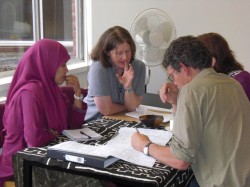Background to planning a workshop
The pages on planning a workshop build on the experience and practices of a number of people who lead workshops and trainings with civil society and development organizations, and who teach courses in universities and adult education settings. The educators and learners alike come from diverse backgrounds – practitioners, activists and academics – with a shared interest in how to bring a clearer ‘power lens’ to their thinking and action as change agents. Their and our purpose has been to better understand how power underpins inequality, exclusion and injustice, how power can be a force for or against positive social change, and what this means for strategy and action.
This guide has emerged from work in various countries and contexts, often as part of international development programmes seeking to strengthen citizen participation, civil society, human rights and governance in the global South. Many international and national NGOs and donor organizations, for example, have taken an interest in power analysis as part of adopting a ‘rights-based approach’ or in promoting citizenship, voice and accountability. However, these approaches have also been taken up and adapted in Northern countries, as part of efforts to empower marginalized people and to deepen participation in democratic processes. The North has much to learn from the South, and such geographic distinctions have become less meaningful as similar challenges arise in a diverse contexts and innovations travel in all directions.
Change agents in all settings have found that getting a better grasp of the complexity of power in theory and practice can help them to:
- become more mindful, strategic and power-conscious in addressing the root causes of inequality and exclusion
- develop a more critical appreciation of the opportunities, limitations and spaces for action and influence
- make changes in their own thinking and behaviour, within peer groups and organisations and in wider social and political structures
The facilitators and educators who developed these approaches did so over many years, borrowing and building on each others’ concepts, methods and techniques. It is difficult to identify the origins of all these materials, but some key sources are gratefully acknowledged in the introduction to power analysis (and credited where possible). We hope that others will continue to contribute learning materials and designs for exercises and learning events on power.


